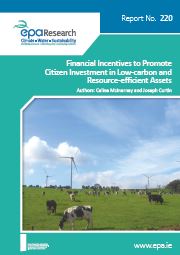Authors: Celine McInerney and Joseph Curtin
Summary: Research Report 220 on Financial Incentives to Promote Citizen Investment in Low-carbon and Resource-efficient Assets

Ireland has considerable challenges in transitioning to a low-carbon resource-efficient economy. EU emissions and renewables targets are not on track to being met, leaving the exchequer exposed to several hundred million in possible fines. If Ireland is to meet its ambitious climate change and renewable energy objectives, rapid decarbonisation is required over the coming decades. This report presents findings from a literature review, national and international case studies, and a survey of Irish citizens.
In Ireland, in contrast to countries such as Denmark and Germany, there are few examples of citizen and community renewable projects. Opposition to renewable technologies in rural communities has emerged as a key barrier to meeting decarbonisation objectives, leading to a key policy focus on promoting “energy citizenship”. A survey conducted for this research suggests that 78% of a representative sample of Irish citizens were interested in investing in distributed renewable energy technologies. However, investment amounts were found to be low relative to project costs, and the majority of citizens were found to be highly risk-averse. Wealthier cohorts with some experience of making investment decisions were more likely to consider investing, and key barriers to financial citizen participation included insufficient savings and no access to loan finance.
The research finds that financial incentives designed with citizen investors in mind, including feed in tariffs, feed in premiums, quota schemes, grants and taxes, have been successfully deployed within a variety of contexts. Soft loans, however, have been less effective as a stand-alone instrument . The International case studies illustrate that citizens can be mobilised as investors, both in countries with a long history of citizen investment (Germany and Denmark), but also in jurisdictions where this tradition is not evident (the UK and the Canadian state of Ontario). Financial supports introduced at the early stage of project development, when risk is highest, emerge as a key success factor. Agency support for citizen groups, along with clear and consistent planning policies that are streamlined with incentive application and grid access procedures, were also found to be of high importance.
The findings suggest that larger projects will generally require a professional developer acting in concert with local actors, and in these cases a market-based incentive programme, such as a quota scheme, can be designed to favour equity participation from local citizens and community groups. A mandate requiring a share offer to local citizens (as in Denmark) could also be considered. Setting a target for community ownership, following the Scottish approach, would underpin Government commitment to local ownership outlined in the Energy White Paper (2015). Furthermore, community groups will need significant agency support if they are to acquire the necessary technical, financial, legal and other skills. Many industrialised countries are incentivising the up-take of distributed renewable energy technologies such as wind, solar and biomass, which can make a very substantial contribution to global decarbonisation. These technologies can be particularly attractive for local citizen investors because they are decentralised, small in scale, modular and reliable. Mobilising citizen investment has the potential to unlock a new source of capital, but also to promote greater levels of understanding and acceptance of these technologies in local communities.
https://www.epa.ie/media/epa-2020/publications/research/Thumb-220[1].jpg